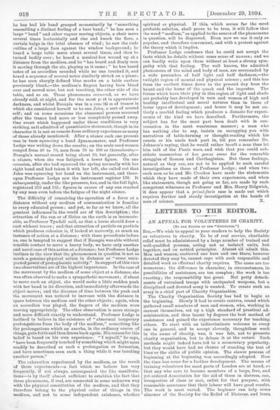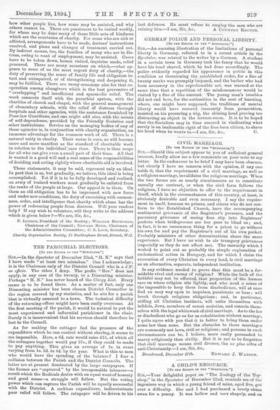LETTERS TO THE EDITOR.
AN APPEAL FOR VOLUNTEERS IN CHARITY.
[To THE EDITOR OF THE " SPECTATOR:] SIR,—We wish to appeal to your readers to help the Society as volunteers in charity. To be of real service, charitable relief must be administered by a large number of trained and well-qualified persons, acting not as isolateit units, but. together, and on settled principles. Almost all admit this. Men and women, scattered one here and one there, however devoted they may be, cannot cope with such responsible and detailed work as effectual charity requires. The cases are too numerous ; the difference in character, in circumstances, in. possibilities of assistance, are too complex ; the work is too exacting; the responsibility too great. Not petty detach- ments of untrained troops with antiquated weapons, but a. disciplined and devoted army is wanted. To create such an. army is a chief part of Charity Organisation.
The Charity Organisation Society has had to begin at, the beginning. Slowly it had to create centres, round which gathered small numbers of men and women, who, working in earnest themselves, set up a high standard of practical ad- ministration, and thus learnt by degrees the best method of assistance and gained the experience necessary for teaching: others. To start with an indiscriminate welcome to every one in general, and to accept slovenly, thoughtless work in the name of charity, was, it was felt, not to promote' charity organisation, but to debase it at the outset. Such: methods might indeed have led to a momentary popularity, but they would have had no chance of standing the test of time or the shifts of public opinion. The slower process of beginning at the beginning was accordingly adopted. Now. the time has come for a further development. The means of training volunteers for most parts of London are at hand, so that any who Care to become members of a large, free, and yet ordered Association for the aid of those in distress, can,, irrespective of class or sect, enlist for that purpose, with reasonable assurance that their labour will have good results. The work is most varied. The beginner can help some almoner of the Society for the Relief of Distress, and learn.
how other people live, how some may be assisted, and why others cannot be. There are pensioners to be visited weekly, for whom may be done many of those little acts of kindness which are the courtesies of charity. For some who are sick or afflicted, arrangements have to be made, doctors' instructions 'received, and plans and changes of treatment carried out. By indirect means, too, the families of many who are in dis- 'trees, owing to want of employment, may be assisted. Cases have to be taken down, homes visited, inquiries made, relief .procured. There are many occasions on which,—what ap- pears to some of us the most urgent duty of charity,—the duty of preserving the sense of family life and obligation in- tact and unimpaired, or of strengthening and deepening it, may be fulfilled. There are many occasions also for that co- -operation among almsgivers which is the best preventive of " overlapping" and insufficient and spasmodic relief. The work connects itself with the parochial system, with the charities of church and chapel, with the general management of elementary schools, with the relief of distress through hospitals and other agencies, with the assistance furnished by Poor-law Guardians, and one might add also, with the means of self-dependence, provided by the Friendly Societies and 'ether institutions, Service on the managing bodies of any of these agencies is, in conjunction with charity organisation, an immense advantage for the common work of all. There is a .natural unity in charity. Their cause is ours, as will become 'more and more manifest as the standard of charitable work in relation to the individual:case rises. There is thus scope for all who can give even a small part of their time. All that is wanted is a good will and a real sense of the responsibilities .of deciding and acting rightly where charitable aid is involved.
These statements, it may be said, represent only an ideal. In part that is so, but gradually, we believe, this ideal is being accomplished. Yet if it is to be fully developed and realised, an army of trained workers must gradually be enlisted from the ranks of the people at large. Our appeal is to them. On them an old obligation has to be impressed with new force and under new conditions, the duty of exercising with earnest- ness, order, and intelligence that charity which alone has the power of redeeming people from distress. Will your readers help P If any wish to volunteer, will they write to the address -which is given below P—We are, Sir, Ste.,
F. LONDIN, President of the Society ; WILLIAM BOUSFIELD, Chairman of the COU.D.61; EDWARD BOND, Chairman of the Administrative Committee; C. S. LOCH, Secretary.
-Charity Organisation Society, 15 Buckingham Street, Stranot, W.C.



































 Previous page
Previous page